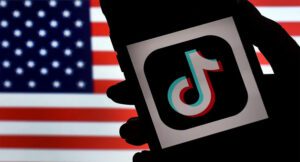In a move that rekindles national security concerns, a bipartisan group of US Senators proposes fresh legislation that could lead to a ban on TikTok, the hugely popular video-sharing app. This renewed effort comes after previous attempts to restrict the app stalled.
The proposed bill, titled the “Restricting the Emergence of Security Threats that Risk Information and Communications Technology (RESTRICT) Act,” would empower the US government to take action against foreign-owned technologies deemed a security risk. While not explicitly naming TikTok, the legislation would grant the Commerce Department the authority to ban apps like it, particularly those with ties to countries considered adversaries, like China.
National Security Concerns Reignite
Senators cite national security concerns as the primary driver behind the RESTRICT Act. They worry that the Chinese government could access user data collected by TikTok due to its ownership by ByteDance, a Chinese multinational. China’s cybersecurity laws compel domestic companies to cooperate with government requests for data, raising concerns about the potential for user information to fall into the wrong hands.
“We can’t ignore the potential national security risks posed by these apps,” said Senator Mark Warner, a Democrat co-sponsoring the bill. “This legislation would give us the tools we need to address these threats head-on.”
TikTok has consistently denied data sharing with the Chinese government and emphasizes that user information is stored outside China. The company also maintains a separate operation for the US market. However, these assurances haven’t entirely quelled anxieties among US lawmakers.

Beyond Data: Algorithmic Concerns
Beyond data security, some Senators express unease over the potential for manipulation through TikTok’s algorithm.
“These apps have the potential to become powerful tools for shaping public opinion,” said Senator John Thune, a Republican co-sponsoring the bill. “We need to ensure that they’re not being used to undermine American interests.”
Free Speech Concerns and Uncertain Path
Some lawmakers oppose the proposed legislation, raising free speech concerns. They argue that a ban on TikTok would set a dangerous precedent, potentially paving the way for censorship of other foreign-owned platforms.
Additionally, the path for the RESTRICT Act remains uncertain. It requires approval from both houses of Congress and the president’s signature. While the bipartisan sponsorship suggests potential for progress, it could face hurdles during the legislative process.
A Potential Compromise? Content Moderation and Data Security Measures
Some experts suggest a potential compromise might involve stricter content moderation policies and robust data security measures on TikTok’s part. This could involve independent audits and increased transparency on user data handling practices.